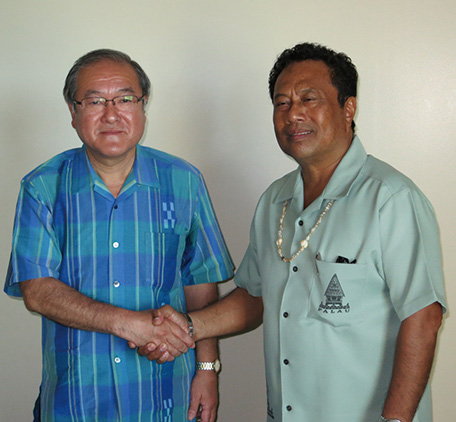Japan's Official Development Assistance White Paper 2012
Section 4 Disaster Risk Reduction Cooperation for Island Countries
Most of the Pacific island countries are comprised of volcanic islands or atoll islands. These countries are also particularly susceptible to the effects of environmental problems of a global scale such as rising sea levels, cyclones, tidal waves, and water shortages. The Pacific region is also a region in which earthquakes and tsunamis frequently occur and in recent years has experienced major damage caused by the Solomon Islands Earthquake in 2007 and the Pacific Ocean Tsunami in 2009. Responding to these kinds of natural disasters is a crucial challenge to the region as a whole.
Japan has to date committed a variety of cooperation to the Pacific island countries in the area of disaster risk reduction. For example, on the Solomon Islands at present, Japan is cooperating to improve the shortwave radio network that broadcasts throughout the country as a means of communicating emergency information to the public in the event of a disaster.
Similarly, in terms of disaster risk reduction, since responses at the community level as well as the administration level are crucial, Japan is implementing a technical cooperation project in Fiji and on the Solomon Islands to strengthen community's disaster management capabilities. This project aims to develop readiness for the appropriate evacuation of people in case of disasters through, for example, establishing early warning systems, improving the capability of the National Disaster Management Office, formulating disaster risk reduction plans and disaster response manuals for these communities, and educational activities and carrying out evacuation training.
In Tuvalu, which is concerned about the effects of coastal erosion due to rising sea levels, Japan is conducting a project to investigate coastal protection. This includes experimentally installing gravel beach nourishment (a coastal protection method using shingle to bed the coast), and, while surveying the effectiveness and environmental effects of the gravel beach nourishment, carring out activities to raise local awareness of coastal disasters. At the same time, a survey is also being conducted of the formation and maintenance of the islands due to so called "star sand" created by coral and foraminifera, and it is expected that these surveys will contribute to the formulation of concrete provisions against coastal erosion in Tuvalu.
In addition to these projects, Japan is also contributing to improve the skills of people in the Pacific island countries through conducting training and dispatching volunteers in areas such as climate change countermeasures, strengthening meteorological observation/forecasting and warning capabilities, and disaster management.
Japan strongly recognized the importance of disaster risk reduction through the Great East Japan Earthquake of 2011. Based on this, Japan announced in the Sixth Pacific Island Leader's Meeting (PALM6) held in Okinawa in May 2012 that it would make "disaster risk reduction cooperation based on the experience of the Great East Japan Earthquake" one of the pillars of assistance over the next three years. In particular, in view of sharing lessons, knowledge and experiences learned from the earthquake with the Pacific island countries, Japan announced that it would keep contributing to upgrading the Pacific Tsunami Warning and Mitigation System in cooperation with the United States and other development partners. In Oceania, a system to communicate information on disasters to the Pacific nations including information from the Pacific Tsunami Warning Center (PTWC) in Hawaii is being introduced. In some instances, however, disaster information does not reach people in the outlying regions and on remote islands since many countries have their territories scattered across wide-stretches of ocean and communications systems are insufficient. Japan is scheduled to conduct assistance to improve this kind of situation.
Japan, as an island country and highly susceptible to the effects of natural disasters, will continue in future to assist the Pacific island countries in the area of disaster risk reduction.

President Remengesau of Palau meets with the Parliamentary Senior Vice-Minister for Foreign Affairs, Shunichi Suzuki. President Remengesau committed to cooperate with the PALM process.
